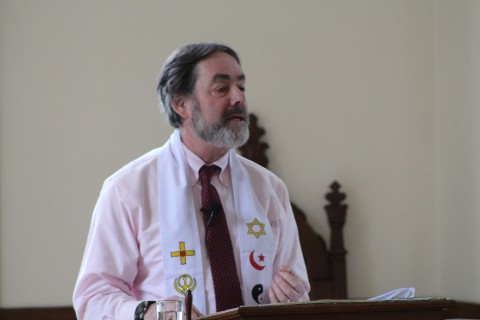Sermon on Sacred Activism at St Johnsbury UU Church
The heart of the UU service I led last Sunday was a sermon I gave about Sacred Activism which its founder, mystic and religious scholar Andrew Harvey, defines it as “a transforming force of compassion-in-action that is born of a fusion of deep spiritual knowledge, courage, love, and passion, with wise radical action in the world.” It is about connecting deep within to heal, to awaken, to transform, and cultivate a profound and FIERCE spiritual love, a reverence and holiness for all that exists, and then to take that love into the world, to heal and transform it, and to serve others by addressing the myriad of human needs and aspirations.
We’re talking about personal transformation and transformation of the world, either one of which is a big undertaking. But the truly radical part of all this is the MARRIAGE between those two, between the inner work within ourselves (spiritual development and personal healing) and the outer work in the world, locally and globally (climate change, Syria war, water quality and neglected children in our own communities). Andrew is saying that we need to do both, aligned with each other and anchored in love, because one reinforces and sustains the other. From my own experience, I know that a sole focus on one can undermine the other.
Solely working within can become self-indulgent and isolating, whereas solely working in the world will likely carry forward our unhealed wounds of anger, fear and control, and thus prevent true change.
Because there’s so much to do in the world, we can easily become overwhelmed and get caught up in how we don’t measure up to famous sacred activists like Gandhi or Martin Luther King, Jr. But each of us is on our own personal path of sacred activism. During the reflection, I encouraged the congregation to take a moment to connect and honor each one’s personal journey. I then shared some of my sacred activist journey which for a long time was rather winding and back-and-forth between the inner and the outer. This included upbringing in Judaism, Holocaust-related sensitivity to suffering, Vietnam-era “us vs. them” political activism, explorations into Buddhism and Native American spirituality, “citizen diplomacy” peace activism, peacebuilding work in conflict hot spots, such as Bosnia, Burma, and Nigeria, then training and service as an interfaith/interspiritual minister. These days I’m still trying to find that elusive balance of the personal and the societal work, but I’m definitely further down the transformation path by how they nourish each other.
In the sermon, I also shared some helpful tools and practices for deepening into one’s sacred activism journey. There are so many of these, including gratitude and welcoming of all that happens in our lives, forgiveness, prayer, meditation, skip a meal in the next 24 hours and giving that money to charity, “follow your heartbreak” to serve someone in need, connect to others with “deep listening” and “loving speech”, and engage in non-argumentative, relationship-building “reflective conversations” with those whom you disagree with on controversial public issues.
Whatever we do though, the key is to make a real commitment to it, and to do it with joy and passion, and, above all, love. As the great 13th century Sufi poet Rumi wrote,
To be born in love
Is to serve all beings and all creation.
Real lovers serve ardently, hopefully,
And in an ecstasy of awe.
